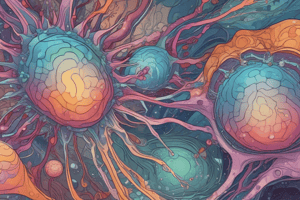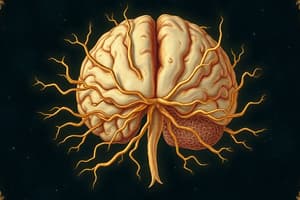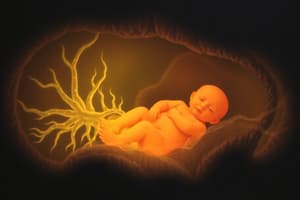Podcast
Questions and Answers
What is the main focus of Week 5 in the course?
What is the main focus of Week 5 in the course?
- Rhythms
- Development of the Nervous System; Brain Injury & Plasticity (correct)
- Comparative Cognition 1
- Biopsychology of: Addiction & Reward
What does the course emphasize about neurodevelopment?
What does the course emphasize about neurodevelopment?
- Genetic factors have no impact on neurodevelopment
- The brain stops developing after early childhood
- The brain develops throughout lifetime experience is key (correct)
- There are no restrictions on changes in the brain
What is the equation for forming a zygote?
What is the equation for forming a zygote?
- Ovum - Sperm = Zygote
- Ovum / Sperm = Zygote
- Ovum + Sperm = Zygote (correct)
- Ovum x Sperm = Zygote
What are the aims of the course regarding adult plasticity?
What are the aims of the course regarding adult plasticity?
What technique provided relief to the amputee with chronic phantom limb pain?
What technique provided relief to the amputee with chronic phantom limb pain?
Where can one find information about the development of the nervous system and brain damage?
Where can one find information about the development of the nervous system and brain damage?
Where can one watch Siddharthan Chandran's TED talk about brain repair?
Where can one watch Siddharthan Chandran's TED talk about brain repair?
Which process fills the space left after apoptosis in the brain?
Which process fills the space left after apoptosis in the brain?
What is a consequence of overproduction of synapses in the young brain?
What is a consequence of overproduction of synapses in the young brain?
Which brain region is involved in working memory and inhibiting inappropriate actions?
Which brain region is involved in working memory and inhibiting inappropriate actions?
What shapes vocal output in birdsong via sensorimotor learning?
What shapes vocal output in birdsong via sensorimotor learning?
What happens to the song of deafened birds after the sensitive period?
What happens to the song of deafened birds after the sensitive period?
What results from early visual deprivation in the primary visual cortex?
What results from early visual deprivation in the primary visual cortex?
What regulates the expression of genes directing the synthesis of CAMs?
What regulates the expression of genes directing the synthesis of CAMs?
What can promote neurogenesis in adult mammals?
What can promote neurogenesis in adult mammals?
What is a consequence of neurons failing to establish correct connections?
What is a consequence of neurons failing to establish correct connections?
What is postnatal growth in the brain a consequence of?
What is postnatal growth in the brain a consequence of?
What is involved in bird song development stages?
What is involved in bird song development stages?
What happens to the song of deafened birds after the crystallized song?
What happens to the song of deafened birds after the crystallized song?
Which of the following is a main neuroplastic response to nervous system damage?
Which of the following is a main neuroplastic response to nervous system damage?
What is a common cause of brain damage and neurological diseases mentioned in the text?
What is a common cause of brain damage and neurological diseases mentioned in the text?
Which cells promote neural regeneration in the peripheral nervous system?
Which cells promote neural regeneration in the peripheral nervous system?
What is virtually nonexistent in the central nervous system (CNS) of adult mammals?
What is virtually nonexistent in the central nervous system (CNS) of adult mammals?
What promotes recovery of function after brain damage according to the text?
What promotes recovery of function after brain damage according to the text?
What has shown potential in promoting recovery after brain damage according to the text?
What has shown potential in promoting recovery after brain damage according to the text?
What is a common way to study responses to neuronal damage mentioned in the text?
What is a common way to study responses to neuronal damage mentioned in the text?
What has been observed in laboratory animals following damage to peripheral nerves and primary cortical areas according to the text?
What has been observed in laboratory animals following damage to peripheral nerves and primary cortical areas according to the text?
What do brain-imaging studies indicate according to the text?
What do brain-imaging studies indicate according to the text?
What is thought to play important roles in recovery of function after brain damage according to the text?
What is thought to play important roles in recovery of function after brain damage according to the text?
What have been correlated with resistance or recovery from neurological injury and disease according to the text?
What have been correlated with resistance or recovery from neurological injury and disease according to the text?
What is unlikely, but possible, in the peripheral nervous system (PNS) according to the text?
What is unlikely, but possible, in the peripheral nervous system (PNS) according to the text?
What is the first phase of neurodevelopment?
What is the first phase of neurodevelopment?
What is the basis for the future peripheral nervous system?
What is the basis for the future peripheral nervous system?
What is the role of cell-adhesion molecules and gap junctions in neurodevelopment?
What is the role of cell-adhesion molecules and gap junctions in neurodevelopment?
What is the main function of neurotrophins such as nerve growth factor (NGF)?
What is the main function of neurotrophins such as nerve growth factor (NGF)?
What is the mechanism underlying axonal growth according to the chemoaffinity hypothesis?
What is the mechanism underlying axonal growth according to the chemoaffinity hypothesis?
What happens approximately 50 days after conception in the central nervous system (CNS) development?
What happens approximately 50 days after conception in the central nervous system (CNS) development?
What is the fate of approximately 50 percent of the neurons produced during neurodevelopment?
What is the fate of approximately 50 percent of the neurons produced during neurodevelopment?
What guides the migration of neural tube cells?
What guides the migration of neural tube cells?
What is the earliest type of cells in neurodevelopment?
What is the earliest type of cells in neurodevelopment?
What is the basis for the future spinal cord and brain?
What is the basis for the future spinal cord and brain?
What is the main factor promoting synapse formation?
What is the main factor promoting synapse formation?
What is the final phase of neurodevelopment involving synapses?
What is the final phase of neurodevelopment involving synapses?
Flashcards are hidden until you start studying
Study Notes
Neurodevelopmental Process Overview
- The five phases of neurodevelopment are induction of the neural plate, neural proliferation, migration and aggregation, axon growth and synapse formation, and neuron death and synapse rearrangement.
- Induction of the neural plate occurs approximately 18 days after gestation, induced by chemical signals from the mesoderm.
- The earliest cells are totipotent, then pluripotent, and finally multipotent as they become neural plate cells.
- The neural tube forms the basis for the future spinal cord and brain, while the neural crest forms the basis for the future peripheral nervous system.
- Approximately 40 days after conception, the tissue that develops into the central nervous system (CNS) is recognizable as a fluid-filled tube, with cells proliferating in species-specific ways.
- Neural tube cells proliferate and differentiate, resulting in the development of specific characteristics and the formation of major brain structures.
- Neural tube cells migrate through radial and tangential migration, guided by chemical signals and glial cells, and align themselves with other cells to form structures.
- Cell-adhesion molecules and gap junctions aid in migration and aggregation, and axons and dendrites begin to grow once migration is complete.
- The first demonstration of precise axonal growth was shown by Sperry in 1940, with the chemoaffinity hypothesis explaining the mechanisms underlying axonal growth.
- The formation of new synapses depends on the presence of glial cells, especially astrocytes, and chemical signal exchange between pre- and postsynaptic neurons.
- Approximately 50 percent more neurons than needed are produced, and both passive (necrosis) and active (apoptosis) cell death occur, with apoptosis being safer than necrosis.
- Neurotrophins such as nerve growth factor (NGF) promote growth and survival, guide axons, and stimulate synaptogenesis, while neurons die due to failure to compete for chemicals provided by targets.
Studying That Suits You
Use AI to generate personalized quizzes and flashcards to suit your learning preferences.




